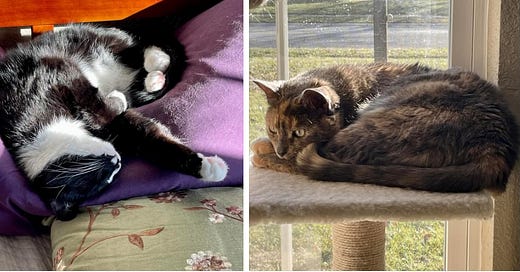Two weeks ago, I attended my first AWP* conference. I was looking forward to meeting some friends from online writing workshops in person—and that was great! I was also looking forward to talking about my first book-length translation as part of a panel—and it went well! But otherwise, my goal was to get through the conference and have it over with. My only reference point for a conference attended by several thousand people dates from my previous career as a teacher of French and Spanish. I attended ACTFL** (the national conference for language teachers) three times, and each time I left thinking I should never put myself through that again.
(*) Formerly Associated Writing Programs, now the Association of Writers and Writing Programs—but who wants to say W twice in a row?
(**) Formerly the American Council on the Teaching of Foreign Languages, now just ACTFL—because there’s nothing “foreign” about many of the non-English languages its members teach, but changing the name of a decades-old organization is hard.
ACTFL wasn’t all bad, of course. It gave me a chance to meet up with far-flung friends, and I always came away from sessions with new ideas and resources to explore in my classroom. But the main sensory memory I retain from the ACTFL conferences I attended is feeling deeply uncomfortable in a cacophonous, overheated exhibition hall as salespeople desperately tried to get me to hand over not only my own contact information but also the contact information of administrators who could authorize the purchase of the thousands of dollars of textbooks or software they were trying to push on me.
By contrast, while the exhibition hall at AWP was just as packed and noisy as I’d imagined, it was a whole lot friendlier. It was a pleasure to chat in person with editors I’ve worked with, but even at publications I’ve had no contact with, folks were nice. They opened conversations by asking what genre I write; they told me about upcoming submission periods and what they’re looking for; they were unreasonably excited to meet a translator. Everyone had something to sell, but the atmosphere wasn’t salesy. The publishing industry has plenty of gatekeeping, but among the small presses and lit mags in attendance at AWP, the vibe was welcoming, engaging, and not at all competitive: we’re all trying to do something that’s basically impossible, so we might as well enjoy each other’s company. So while I don’t intend to go to AWP every year—I haven’t had a fundamental personality change—this year’s conference wasn’t my last.
Self-Promotion Corner
Last month, I was honored to appear on the shortlist for the Welkin Mini, a 100-word microfiction contest. You can check out my piece here and find all the winning and shortlisted stories here. You’ll be amazed by the range of genres, settings, and styles that can be conveyed within that tiny word count!
A Humble Suggestion
In each newsletter, I’ll offer at least one recommendation for your reading, watching, or listening pleasure. This time around: a couple of books for writers.
Jami Attenberg’s new book, 1000 Words: A Writer’s Guide to Staying Creative, Focused, and Productive All Year Round, is based on her annual #1000wordsofsummer challenge. Without coming across as self-help-ish in tone, Attenberg offers frank, sound advice on building a mindset conducive to jumpstarting or resuming a creative practice. Her guidance is interspersed with pep talks from guest authors who have contributed to the summer events over the last several years, gathered here in a thoughtful, thematic arrangement. The overall effect is a sense of commonality and community in the struggles and joys that writers experience. This is a book that a writer could pick up again and again when in search of kind but firm encouragement at any stage of the writing process.
I’m shocked to discover that I haven’t yet mentioned Matt Bell’s Refuse to Be Done: How to Write and Rewrite a Novel in Three Drafts in this newsletter, because in other contexts, I talk about it compulsively. To be clear, Bell isn’t promising a faster and easier path to completing a novel or suggesting there’s anything wrong with writers whose process involves a dozen drafts. What he calls “drafts” are broad stages in the process: a playful, exploratory drafting phase; a process of structuring and honing that messy first draft into the story you’ve decided to tell; and a polishing phase. If you don’t identify fully as a “plotter” or a “pantser,” there’s a good chance Bell’s approach will feel comforting and inspiring.
Here, Look at My Cats
The world is a mess, and you might welcome a pleasant distraction. For what it’s worth, here are my cats.
See you back here soon!
Laura




